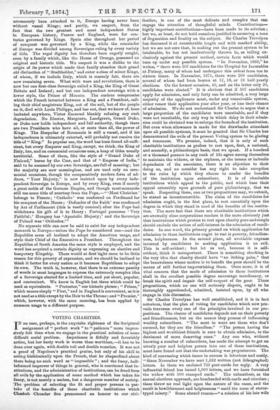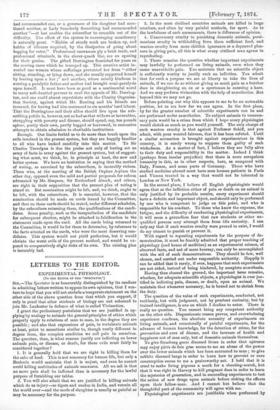VOTING CHARITIES.
lisation, is one of the most delicate and complex that can I engage the attention of thoughtful minds. Contributions--. highly important contributions—have been made to its solution ; but we, at least, do not hold ourselves justified in assuming a tone of dogmatism and finality on the subject. Sir Charles Trevelyan has discussed it at considerable length and with marked ability, but we are not sure that, in making out the present system to be intolerable, he has not inadvertently thrown in, as telling ex- elusively against the present method, certain facts which would turn up under any possible system. "In November, 1868," be writes, "there were 307 candidates for the Hospital for Incurables at Putney, many of whom had undergone this ordeal from ten to I sixteen times. In November, 1871, there were 298 candidates, several of whom had been beaten at 17, 18, or 19 half-yearly elections. On the former occasion, 40, and on the latter only 20, candidates were elected." It is obvious that if 307 candidates apply for admission, and only forty can be admitted, a very large majority of the applicants must, under any conceivable system, either renew their application year after year, or lose their chance of admission. We do not understand Sir Charles to argue that a large proportion of the candidates were unsuitable, and if they were not unsuitable, the only way in which delay in their admis- sion could be obviated was to enlarge the bounds of the institution. But even when allowance is made for the drawbacks attendant upon all possible systems, it must be granted that Sir Charles has demonstrated the evils of the present Voting system to be glaring and venomous. We premise, indeed, that it is only of such charitable institutions as profess to rest upon, first, a national, and secondly, a philanthropic heals, that we speak. If a hundred or a thousand persons in any rank of life agree among themselves to maintain the widows, or the orphans, or the insane or imbecile dependants of the associates, there is no objection to their doing so, and no outsider has any right to take exception to the rules by which they choose to confer the benefits of the institution upon subscribers. It is of charitable institutions which appeal to the public, and which base their appeal ostensibly upon grounds of pure philanthropy, that we speak. Respecting these, one or two propositions may, we submit, be stated as incontrovertible. The claim of the candidates for admission ought, in the first place, to rest essentially upon the degree in which they stand in need of the benefits of the institu- tion. The mere fact that there are charitable institutions which are avowedly close corporations renders it the more obviously just that institutions which protess to rest upon charity pure and simple should exclude the action of self-interest in the admission of candi- dates. In one word, the primary ground on which application for admission to these institutions ought to rest is poverty, friendless- ness, helplessness. In the second place, all avoidable expense incurred by candidates in making application is an evil. This is self-evident ; but let us not, because it is self- evident, think it unimportant. There is something shocking in the very idea that charity should have "an itching palm," that the benevolence whose motive is to benefit the poor should be the means of still further impoverishing them. Once more, it is of vital concern that the mode of admission to these institutions shall in the smallest possible degree encourage mendicancy, or break the spirit and impair the self-respect of the poor. These propositions, which no one will seriously dispute, ought to be thoroughly apprehended, admitted, insisted upon, by all who engage in this discussion.
Sir Charles Trevelyan has well established, and it is in fact notorious, that the plan of voting for candidates which now pre- vails traverses every one of the principles involved in our pro- positions. The chance of candidates depends not on their poverty and friendlessness, but on the means they possess of influencing wealthy subscribers. "The moat in want are those who don't succeed, for they are the friendless." "The person having the highest and wealthiest friends is sure to obtain admission, to the detriment of more deserving cases." Any one who, without knowing a number of subscribers, has made the attempt to get an utterly poor and helpless person into one of these institutions, must have found out that the undertaking was preposterous. The kind of canvassing which issues in success is laborious and costly. "Since November we have sent 1,532 written (not lithographed) letters. In these we enclosed 723 post-cards for reply. A very influential friend has issued 1,000 letters, and we have furnished the widow with 500 stamped cards." The subscribers, as the annual elections approach, are bombarded with cards and circulars ; these throw no real light upon the nature of the cases, and the result is bewilderment and helplessness " amid the maze of stereo- typed misery." Some absurd reason—" a relation of his late wife
had recommended one, or a governess of his daughter had men- tioned another, or Lady Somebody Something had recommended another "—at last enables the subscriber to scramble out of the difficulty. The effect of the system in encouraging mendicancy is naturally great. "Habits of steady work are broken up, and habits of idleness acquired, by the dissipation of going about begging for votes." Professional canvassers ply a brisk trade, and professional criminals, in the clever-quack line, see an opening for their genius. The gifted Dorrington flourished for years on the moving cases which he trumped up. This creative artist in- vented one woman whose sufferings prevented her from "either sitting, standing, or lying down, and she usually supported herself by leaning upon a bar ;" and another, whose saintly kindness in nursing a paralytic father and mother had brought semi-paralysis upon herself. It must have been as good as a sentimental novel to many soft-hearted persons to read the appeals of Mr. Dorring- ton, and one could almost expostulate with the Charity Organisa- tion Society, against which Mr. Banting and his friends are incensed, for having had him sentenced to six months' hard labour. That the Dorringtons and their allies should live upon the sub- scribing public is, however, not so bad as that widows or incurables, struggling with poverty and disease, should spend, say, ten pounds apiece, partly their own, partly begged or borrowed, in successive attempts to obtain admission to charitable institutions.
Enough. Our limits forbid us to do more than touch upon the evils involved in the present system, but they are happily familiar to all who have looked candidly into this matter. To Sir Charles Trevelyan is due the praise not only of having set an army of facts in array against the present system, but of suggest- ing what must, we think, be, in principle at least, the new and better system. We have no hesitation in saying that the method of voting, as exercised by the subscribers, is incurably vicious. Those who, at the meeting of the British Orphan Asylum the other day, opposed even the mild and partial proposals for reform advocated by Mr. Simpson, Sir Rutherford Alcock, and others, are right in their supposition that the present plan of voting is aimed at. But nomination might be left, and, we think, ought to be left, with the subscribers. It is essential, however, that the nomination should be made on cards issued by the Committee, and that on these cards should be stated, under different schedules, by the subscribers returning them, the qualifications of the candi- dates. Some penalty, such as the incapacitation of the candidate for subsequent election, might be attached to falsification in the statement made upon the card. All the cards being returned to the Committee, it would be for them to determine, by reference to the facts attested on the cards, who were the most deserving can- didates. This system would not yield perfection, but it would obviate the worst evils of the present method, and would be ex- posed to comparatively slight risks of its own. The existing plan is incurably bad.



































 Previous page
Previous page